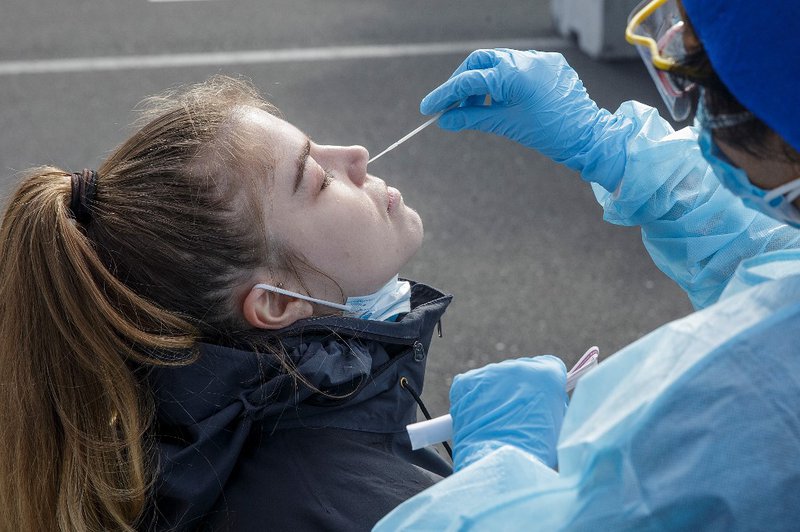As COVID-19 rages, world risks losing TB gains
Updated | By AFP
In the year since COVID-19 flipped the world on its head, diagnosis and treatment of another serious lung disease tuberculosis has plummeted, leaving experts fearful that progress in tackling that pandemic will be lost.

Tuberculosis is treatable and easily diagnosed yet until Covid-19 emerged it was the world's biggest infectious killer, leading to 1.4 million deaths each year and infecting more than 10 million people.
While TB has been with humans for millennia, the progress towards eradicating this preventable disease has been painstaking, with the overwhelming majority of cases occurring in developing nations.
In the run-up to World Tuberculosis Day on Wednesday, the Stop TB Partnership warned that lockdowns and healthcare interventions prompted by Covid-19 had seen a 23 percent drop in TB treatment and diagnosis.
That essentially sets the world 12 years back in its fight to eradicate the global killer.
"Twelve years of impressive gains in the fight against TB, including in reducing the number of people who are missing from TB care, have been tragically reversed by another virulent respiratory infection," said Lucica Ditiu, executive director of the Stop TB Partnership.
"In the process, we put the lives and livelihoods of millions of people in jeopardy."
- Worse than feared -
At the start of the pandemic, modelling by Johns Hopkins University showed that a three-month lockdown followed by 10 months of health service disruption would lead to an additional 6.3 million TB cases by 2025.
In the same period, 1.4 million people would die from the disease, the model showed.
Experts now acknowledge the situation is far worse than the one envisaged in the Johns Hopkins' simulation.
Statistics from the nine highest incidence countries -- Bangladesh, India, Indonesia, Myanmar, Pakistan, Philippines, South Africa, Tajikistan and Ukraine -- showed TB diagnosis and treatment has already declined by a total of one million people.
And new studies from India and South Africa shows that people suffering with TB are three times more likely to die if infected with Covid-19.
"The effects of Covid-19 go far beyond the death and disease caused by the virus itself," the World Health Organization's Director-General Tedros Adhanom Ghebreyesus said this week.
"The disruption to essential services for people with TB is just one tragic example of the ways the pandemic is disproportionately affecting some of the world's poorest people, who were already at higher risk for TB."
Jose Luis Castro, president and CEO of global health organisation Vital Strategies, told AFP that the impact of Covid-19 on TB would be felt "for a long time to come".
"Covid-19 has demonstrated just how interconnected we all are," he said.
"No one is safe until we are all safe. We can see our fragility and vulnerability to a deadly virus that is very, very easily passed from person to person. That's a new experience for most people."
- 'Abysmal funding' -
According to WHO figures there are currently over 75 candidate Covid-19 vaccines either on the market or in development.
This time last year, there were none.
The Stop TB partnership says that while there is a newer TB vaccine in the works, at current funding levels it won't come online until 2027 at the earliest.
By that time, millions more will have died.
Castro said that funding towards a new TB vaccine currently stands around $100 million -- one tenth as much as is given to HIV vaccine research.
"We will never develop a pipeline for effective TB vaccines with the abysmal current level of funding," he said.
Thokozile Phiri Nkhoma, a Stop TB Partnership board member and community representative, drew the comparison between the world's response to two distinct respiratory illnesses.
"After less than a year, a vaccine was developed and is now being deployed to help contain and hopefully end Covid-19," she said.
"But although TB has been around since the time of the pharaohs, the only approved vaccine is 100 years old and doesn't fully work. First-line TB treatment is several decades old and drug resistance is on the rise.
"The millions of people with TB who are not found and treated remain at risk of spreading the disease."

Show's Stories
-
Protecting teens online: A guide to parental controls
Parents, it's time to take control of your teen's online safety. Here’s ...
Stacey & J Sbu 3 hours ago -
Woman shares how she bought her first car with cash at 24
What an inspiration to those trying to save and make ends meet. It just ...
Danny Guselli 3 hours ago